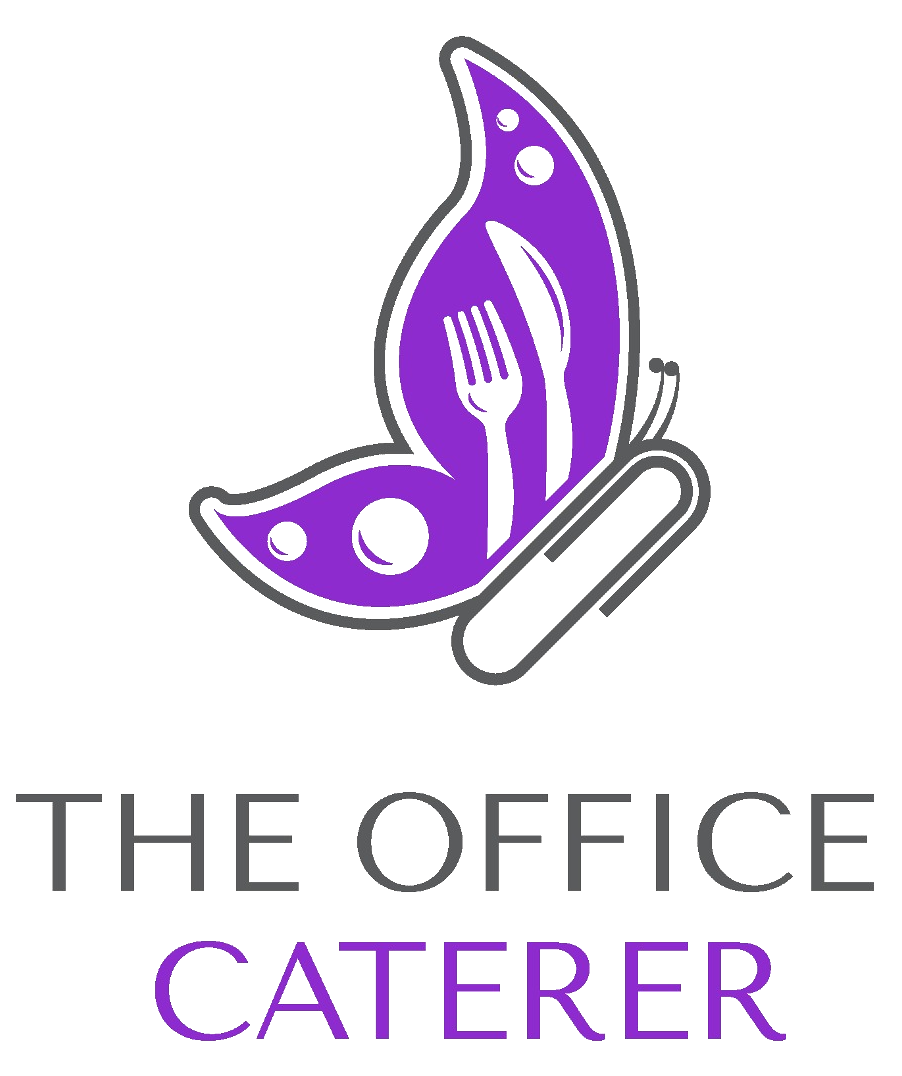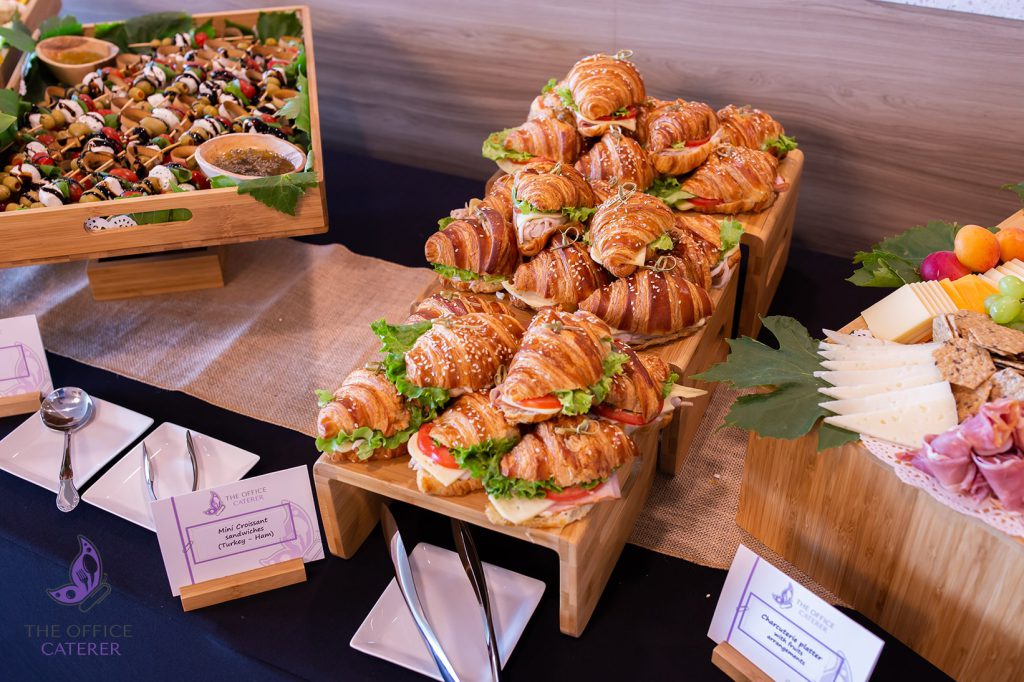Corporate catering refers to providing food services for employees within a business or organization. It encompasses everything from daily meals to special events and comes in many forms to suit companies’ diverse needs. Corporate catering is important in workplace culture, morale, and productivity.
Corporate catering aims to fuel employees conveniently within their workplace and schedule. It can boost energy, focus, collaboration, and job satisfaction. Companies invest in corporate catering for several key reasons:
Well-fed employees have higher energy and concentration levels, minimizing distractions from hunger. Catered food keeps workers nourished and performing at their best.
Onsite meals prevent employees from having to leave to find lunch spots. Catering lets them focus on work instead of meals.
Shared meals unite coworkers and teams, strengthening relationships and promoting idea sharing.
Providing free or subsidized meals demonstrates that a company values its employees and cares about their well-being.
Catering services enhance a company’s employee experience and workplace appeal, making them an attractive perk for recruiting top talent.
Catering services can provide food for company meetings, celebrations, retreats, and more. Keep reading this blog post by The Office Caterer to learn more about each type:
There are many types of corporate catering to meet diverse business needs, budgets, and cultures. The most common options include:
Contents
Breakfast Catering
Providing breakfast catering is an excellent way for companies to start the day off right for their employees or guests.
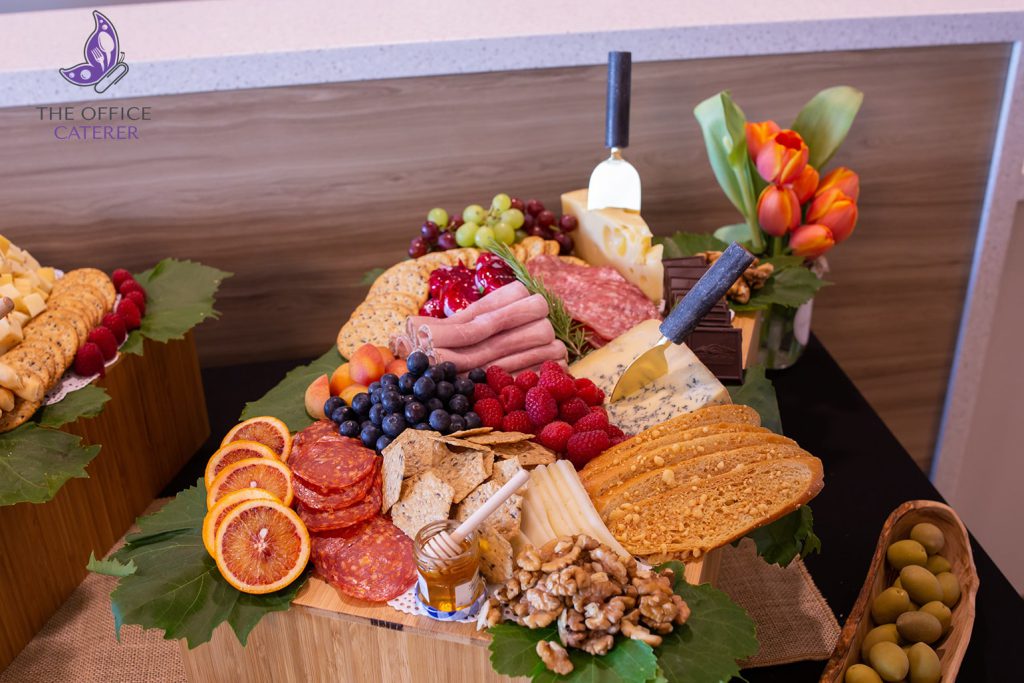
Common breakfast catering options include:
Pastries
Croissants, muffins, and Danishes are popular morning bakery items. They provide a quick carb and energy boost.
Breakfast Sandwiches
Customizable sandwiches with eggs, cheese, meat, and veggies on an English muffin or bagel are convenient and filling.
Yogurt Parfaits
Yogurt, granola, and fresh fruit make for a balanced breakfast option.
Fresh Fruit
Sliced melons, berries, citrus fruits add vitamins and refreshment.
Oatmeal
Hearty oats can be topped with brown sugar, nuts, dried fruit, or other toppings.
Coffee and Tea
Hot beverages are essential for caffeine to start the day. Offer regular and decaf, plus milk and sweeteners.
Providing breakfast catering has many benefits for companies and their employees. It can increase productivity and morale by ensuring everyone has a satisfying meal to start their workday. Breakfast helps employees be energized, focused, and in a positive mood.
Corporate caterers need to consider dietary restrictions when planning breakfast menus. Common considerations include:
- Gluten-free pastries or bread for sandwiches
- Dairy-free milk alternatives
- Vegan protein options without eggs or meat
- Nut-free granola or oatmeal toppings
- Accommodations for common allergies like eggs, dairy, or soy
With thoughtful breakfast catering, companies can kickstart the workday on a positive note and meet their team’s nutritional needs.
Lunch Catering
Lunchtime is a key meal for corporate catering.
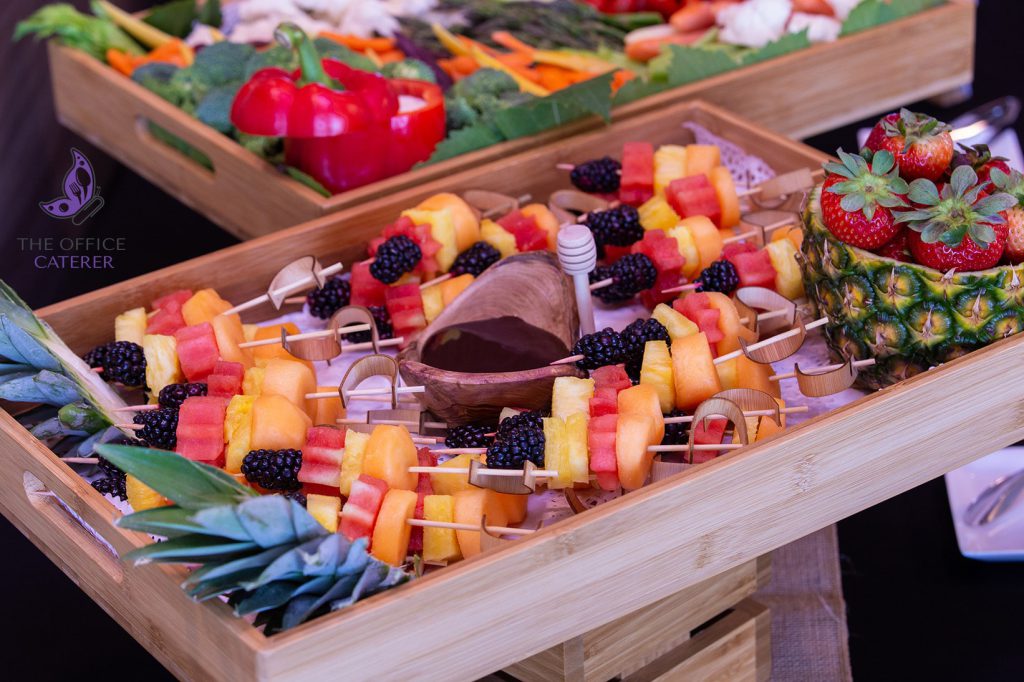
Companies want to provide tasty and satisfying lunch options to fuel employees’ afternoons. There are several popular formats for corporate lunch catering:
Deli Sandwiches
Deli sandwiches allow employees to customize their lunch. Caterers can set up sandwich stations with various breads, meats, cheeses, vegetables, and condiments so each person can create their perfect sandwich. This gives employees control over their meals.
Salad Bars
Salad bars provide a healthy lunch option by allowing people to build salads. Caterers can supply a salad bar with fresh greens, vegetables, proteins like grilled chicken, and assorted dressings. Salad bars work well for companies focused on nutrition.
Hot Entrees
Some companies prefer hot-plated lunches to cold sandwiches or salads. Caterers can provide chef-prepared hot entrees like pasta, chicken dishes, beef entrees, and sides. This gives a more traditional lunch experience.
Soups
Hearty soups make good corporate lunches, especially in colder months. Caterers can make soups like chicken noodles, tomato basil, or broccoli cheddar to accompany sandwiches or salads.
The key to corporate lunch catering is providing enough variety to satisfy diverse employee preferences while managing different dietary needs. Caterers must offer options for vegetarian, gluten-free, dairy-free, and other special diets. Careful labeling and separation of foods help keep meals accessible to all.
Dinner Catering
Dinner catering is less common for corporate events than breakfast or lunch catering, but it can be a great option for special occasions. It offers an elevated dining experience that makes company events feel extra special.
For corporate dinner catering, options may include:
- Plated dinners featuring chicken, fish, steak, or vegetarian entrees. Plated service allows guests to select their main course in advance.
- Buffet service with carving stations for roasted meats, pasta stations, and sides like roasted vegetables and starches. Buffets allow for more casual dining and variety.
- Cocktail stations are popular ways to start an event. Popular past appetizers include crostini, satay skewers, and bacon-wrapped scallops. Cocktail stations feature bites like cheese, veggies, and dips.
- Family-style service with shared platters of food at each table. Family-style dining encourages connections between colleagues.
- There are food stations where guests can sample and mix and match, like a taco bar, slider station, or mashed potato martini bar. The stations are interactive and conversational.
- Dessert may be a plated course, passed bites, or a dessert table display. Sweet treats like cake, brownies, and cookies make a meal feel celebratory.
Dinner catering allows companies to host special occasions like milestone events, retirements, awards ceremonies, and holiday parties in style. The more elegant menu and service make employees feel appreciated.
Snack and Coffee Catering
Corporate catering must consider keeping employees fueled between meals. Coffee bars, snack stations, fruit baskets, and yogurt parfaits are popular options for providing quick bites and preventing energy crashes throughout the workday.
Coffee bars with specialty coffee drinks, teas, and snacks are a staple in many offices. Having baristas onsite to prepare made-to-order beverages is a nice perk that makes employees feel cared for. The coffee bar can also be self-serve with things like coffee pots, a variety of creamers and sweeteners, an assortment of teas, and snacks like granola bars, trail mix, fresh fruit, and baked goods.
Snack stations set up around the office are another great option. These allow employees to grab something to eat whenever they need a little pick-me-up. Snack stations may include items like:
- Whole fruit like apples, oranges, bananas
- Dried fruit, nuts, seeds
- Granola, protein bars, nutrition bars
- Yogurt cups, yogurt parfaits
- Veggies and hummus, guacamole
- Cheese, crackers, olives
- Popcorn, pretzels, tortilla chips
The key is providing nutritious snacks that boost energy without too much sugar. It’s also important to accommodate various dietary needs and preferences. Rotating the selection helps keep the snack stations interesting.
Special Event Catering
Special event catering provides food and beverages for celebratory occasions like holiday parties, birthdays, anniversaries, and retirements.
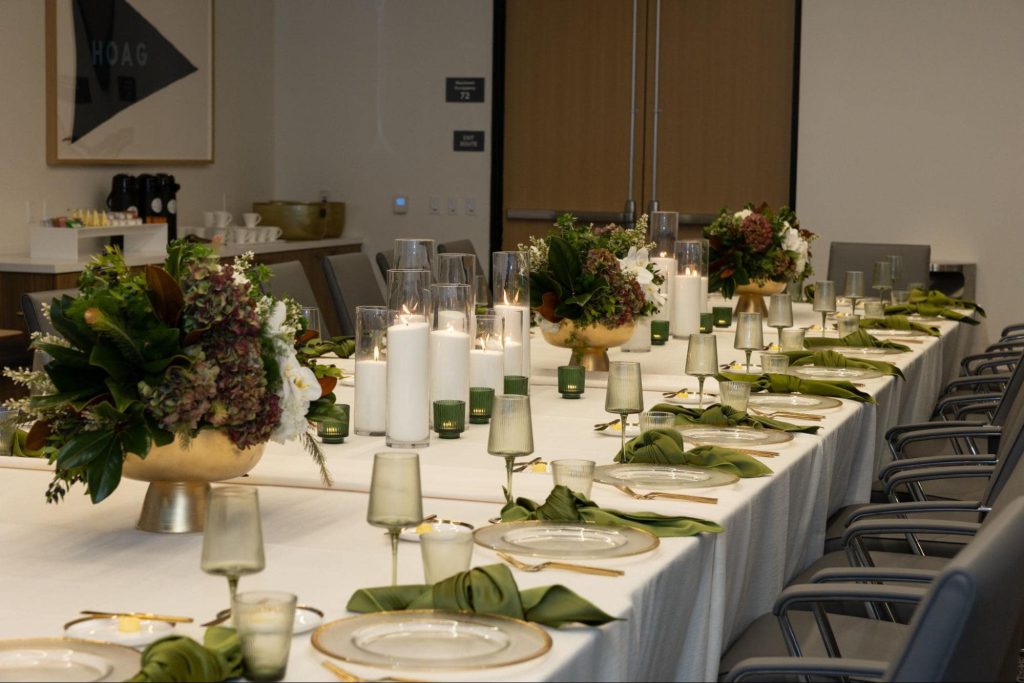
Companies often hire caterers to handle all the details for these special events so employees can enjoy the party without any extra work.
The caterer will work closely with the company to create a custom menu and theme for the event that fits within their budget. Popular catering options for special events include passed hors d’oeuvres, food stations, buffets, plated dinners, dessert displays, and open bars. The caterer can decorate the event space and provide coordinated linens, glassware, and plates that match the theme.
Beyond the food, professional caterers also handle event planning and coordination for special events. This includes arranging audio/visual needs like microphones, speakers, or projection screens. They’ll also set up seating arrangements, bars, food stations, and other necessary rentals. Some full-service caterers can even provide entertainment, photographers, florists, valet parking attendants, and other special touches.
Their experience coordinating corporate events allows caterers to ensure everything runs smoothly. They’ll work closely with the client to arrange timing for speeches, toasts, meals, and other agenda items. Many caterers also have relationships with unique off-site venues, allowing companies to hold special events outside the office.
Dietary Restriction Catering
Corporate catering companies must be prepared to accommodate a range of dietary restrictions and preferences.
Some best practices for managing dietary restrictions include:
- Ask employees to provide advance notice of vegetarian, vegan, gluten-free, kosher, halal, or allergy needs. This allows the caterer to plan appropriate options.
- Work with the caterer to provide menu options that cover common dietary needs. Have vegetarian, vegan, and gluten-free choices at a minimum.
- For buffet service, make sure dietary restriction options are clearly labeled.
- For plated service, develop a system to track which meal is ordered and ensure the correct meal is delivered to each guest.
- Accommodate religious restrictions like kosher and halal by having the caterer use kosher-certified or halal ingredients, separate cooking equipment, etc.
- Take allergies seriously by avoiding cross-contamination, listing every ingredient, and making appropriate substitutions.
- Foster an inclusive environment by making dietary restriction options comparable in quality, price, and presentation to other menu items.
- Communicate the company’s commitment to inclusive catering in contracts with caterers. Make sure they agree to accommodate restrictions.
- Train any internal catering managers or coordinators on managing diverse dietary needs professionally and respectfully.
With proper planning and care, corporate catering can support all employees, no matter their dietary requirements. The result is a more inclusive and satisfactory experience for all.
Catering Logistics
When providing corporate catering, there are several logistical factors to consider:
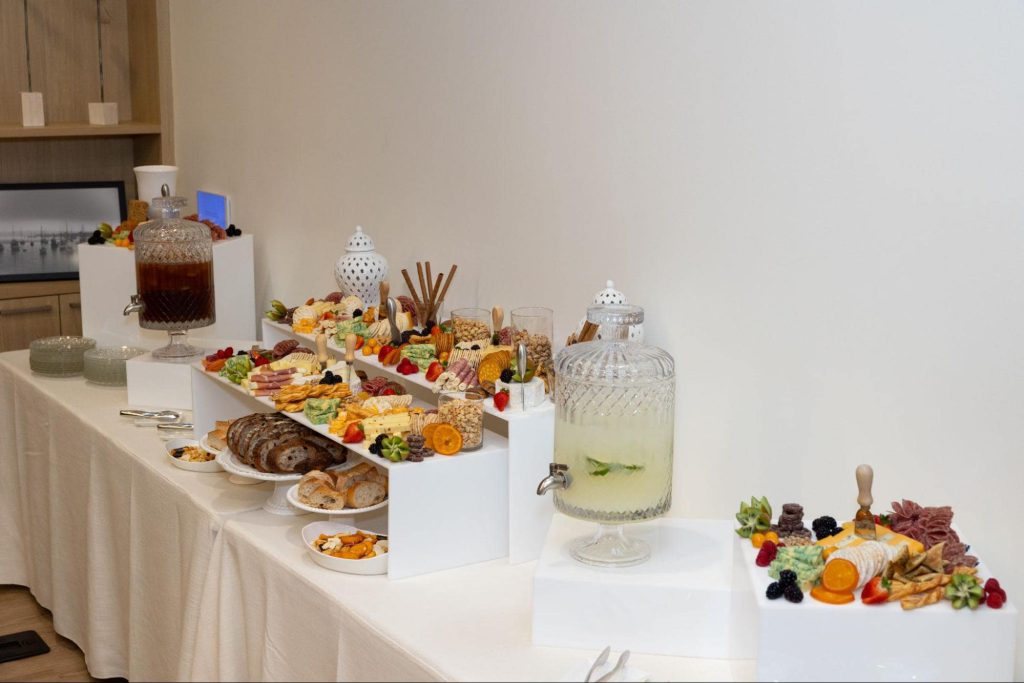
Ordering, Delivery, Setup, Replenishing, and Cleanup
The process starts with ordering the right amount and types of food for the event. Caterers will work with clients to understand the headcount, dietary restrictions, preferred menu, and budget. Once the order is placed, the caterer will deliver the food on the day of the event, along with any needed equipment like chafing dishes, platters, utensils, etc. The catering staff will replenish food and beverages as needed during the event, so supplies stay supplied. At the conclusion, they will break down the displays and clean up any leftovers or trash.
Hiring Dedicated Catering Staff vs Using an Outside Caterer
Companies have two options when it comes to catering staffing:
- Hire dedicated in-house catering staff to handle all food service needs. This allows consistency, familiarity with the company culture, and the ability to work closely with internal event planners. However, it does involve overhead costs of salaries, benefits, training, etc.
- Use an outside/off-site caterer. This provides flexibility and taps into the caterer’s expertise. The caterer brings everything needed and handles the entire process. However, there is less customization and continuity working with outside staff, and communication may be more challenging.
Company size, office layout, and event frequency help determine the best staffing approach. Larger companies holding regular catered events often find it worthwhile to have dedicated catering staff. Smaller companies or occasional catering needs may lean toward outside caterers for convenience. The two approaches can also be combined, with in-house staff handling some duties and outside caterers for large-scale events.
Sustainability
Corporate catering companies are finding ways to become more eco-friendly and sustainable. This includes offering compostable and recyclable serveware to reduce waste.
Caterers are also finding ways to reduce food waste, a major food industry issue. Some strategies include:
- Only preparing enough food to match the number of guests reasonably
- Allowing employees to take leftovers home
- Donating extra food to organizations that can distribute it to those in need
- Implementing trayless systems to reduce over-serving and food waste
- Finding ways to repurpose ingredients and leftovers into new menu items
Sustainable corporate catering minimizes environmental impact while appealing to modern corporate values around social responsibility. It’s a smart path forward for caterers looking to operate ethically and reduce waste.
Conclusion
Corporate catering is an important part of the workplace experience and culture. The right catering choices can boost morale, productivity, recruitment, and retention. Companies have many options to provide tasty and nutritious meals that satisfy employees and fuel their work.
The main types of corporate catering include breakfast, lunch, dinner, snacks/coffee, special events, and catering for dietary restrictions. Each category requires planning regarding menus, ordering, delivery, setup, and presentation. Sustainability is another rising consideration for corporate catering.
Providing catering shows employees that management values and cares for them. It’s a daily perk that improves satisfaction. Employees appreciate not having to leave to find lunch or prepare meals during busy workdays. Onsite meals also allow more time for collaboration. Catering also enables employees to sample diverse cuisines they may not usually access. Corporate catering service by the office caterer is an impactful business strategy that benefits company culture, employee happiness, and the bottom line. Order your office catering session today.
